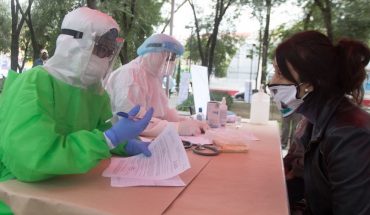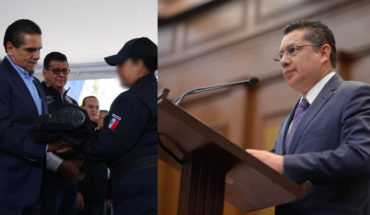in 2017, the federal Government gave almost 5 billion pesos to the municipalities of the country to subsidize training and evaluation of their police officers. Without, however, after the end of the year, hardly 10 thousand of the more than 300 thousand municipal agents credited to have minimum basic skills for the job. Those skills include, for example, know to shoot a firearm, or make an arrest in a legal manner.
The reason? Despite the money and given subsidies, municipalities only got to assess basic skills to 13 thousand municipal agents, of which approximately 1 of every 4 did not pass the test.
“By 2017 in the Executive Secretariat of the national system of public security (SESNSP) ignored if 97% (328 thousand 112) of the 338 thousand 343 police elements in Active counted with basic skills to carry out their functions, since” “only 10 thousand 231 items obtained accreditation in such test”, points out the Superior audit of the Federation.
This is part of the results of an audit of performance to the national system of public security to assess the use, application and impact that in 2017 had subsidies for 4,971 million 700 thousand pesos the Treasury transferred to 300 municipalities of the 32 States in the country, as part of the strengthening program for security (FORTASEG).
In addition to the findings in the deficient evaluation and training, auditors determined that there indicators to monitor the proper use of resources in the municipalities and, consequently, there is no certainty of the impact and benefits generated by the all this money transfer.
“In synthesis is lacking of reliable information on the results obtained through the implementation of all this budgetary program”, says the ASF.
More than 300 thousand municipal police training for which these subsidies are allocated falls short since the design of the evaluation goals.
An example of this is the issue of competencies or skills. The evaluation of them, explain the Auditors, aims to determine “If the elements comprising the public security institutions meet the capabilities of weapons and police shot; fitness and defense; driving police vehicles; detection and conduct of persons; PR-24 baton handling “.
It’s know if agents have the basic knowledge to be a police officer. By law, they have to prove these basic skills every three years.
In Mexico, there are 338,343 municipal police on active, but the goal set by the national security system of evaluation of basic skills in 2017 was 35,549 agents. In other words, the objective was to assess just 10% of the total force State that had.
This minimum goal not met, because at the end of the year only accredited evaluation of core competences of 13,574 elements, 38% of which had marked as objective.
And if that adds that evaluated policemen there were 3,343 who failed (on average 1 of every 4), the final balance is only 10,231 municipal police with certified minimum competencies, of the more than 300 mil in assets that there is in the country. This is equivalent to 97% of the police force not certified in basic skills.
“There are serious deficiencies in the planning and programming process to determine annual goals in the implementation of core competencies and performance evaluations, because that was not considered the real operational capacity and resource allocation”, indicates the report of the Auditors.
The same weaknesses in the area of basic skills extend to other types of assessments. For example, the obligation to evaluate the “performance” of the police and their degree of effectiveness and efficiency. They are tests that also must be made every three years.
What the auditors found was that the goal to meet was too short: just 43,808 active more than 330 thousand agents. Despite this, the goal was not fulfilled because closing the year only had evaluated in performance 36,450 elements (83% of budget and 10% of the State’s total force).
There were cases like Nayarit, where was not evaluated the performance of a single element of the municipal police. Questioned by Auditors on this situation the SESNSP responded that “it has the power to influence the decision of Nayarit or any other municipality assess whether members of their public security institutions”.
Another unfulfilled goal was the evaluate trust (polygraph, health, skills, socio-economic environment) control to the municipal police. In this case the goal that was set was a bit more ambitious: evaluate 84, 261 agents in total, which amounted to 25% of the total State of strength. But neither was accomplished.
Analysis of Auditors shows that at the end of 2017 is reported to 69,309 elements evaluated in control of confidence, which amounts to 82% of the goal that had been raised. As a result, this means that less than a quarter of all the municipal police on active was examined in control of confidence last year.
Meanwhile, the Executive Secretariat justified that there are unforeseen to hinder the implementation of evaluations, as the absence of policemen to dates of evaluation, the personal bajas, disabilities or special commissions that are assigned to the elements.
Regarding issues of training, area for which are also intended for the resources of the subsidy, the report sheds that you were trained to 186,233 municipal police. This figure is above the proposed goal, however, it is just 55% of the State’s total force of agents that are active.
would money thrown in the trash?
in its results report the ASF considers that subsidies granted to municipalities for the training and evaluation of municipal officials in order to strengthen the security of the country operate “inertial way and with” deficiencies”.
this is because the money that is agrees to deliver to the municipalities and is marked in the budget of expenditure of the Federation is distributed, however, its mere distribution does not imply that this outcomes are positive, as it lacks the indicator It is suitable for tracking, so it is not known if the money has any real utility.
What are the Auditors to audit the management of these resources is that the Agency Coordinator – in this case the Executive Secretariat of the national system of public security – does not actually track in depth on how on how money is handled and nor ask for accurate accounts about the same thing.
There is no way to measure the impact that has the application of resources from design plans they lack of indicators suitable for this purpose. It is said that relies to the municipalities to strengthen their police corporations and consequently to reduce violence and improve security, but there is no evidence that this is actually happening.
And less when the figures of crime incidence in the crime of greater impact, homicide, today is at record levels.
“The contribution of the subsidy in the improvement of public security conditions is unknown to not have indicators that would allow you (the SESNSP) measure the progress in the strengthening of municipal public security institutions, and lacked of” reliable information on the results obtained through the implementation of the programme budget”, says the ASF.
The audit extended to the SESNSP a total of eight performance recommendations so that this situation is corrected, and at the same time a suggestion to the Chamber of deputies that will review the way how these resources are allocated and will evaluate the relevance condition these Reçu RSOs to municipalities to change show their correct application.
translated from Spanish: It is not known if 97% of municipal police forces have basic skills
November 10, 2018 |





